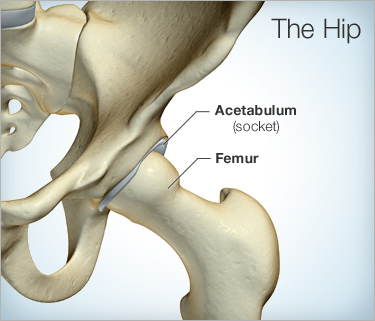Who is a good candidate for hip replacement (arthroplasty), and how long should you wait before taking that route? Those are questions I hear almost daily.
The answer is– no surprise here— complicated.
 It’s complicated in the way that hips, individuals, and lifestyles are complicated, each in its own way.
It’s complicated in the way that hips, individuals, and lifestyles are complicated, each in its own way.
First, there is the hip itself. The human hip is an amazing piece of engineering. It’s a ball joint, designed to carry a sizable load and yet allow us to pivot on a fulcrum.
In a hip replacement, one or both parts may be replaced with artificial ones: the acetabulum, or hip socket, and/or the femoral head, upper end of the thighbone.
The second level of complication concerns the individual. How old are you? How long have you been in pain? Have you tried other therapies? What is the medical diagnosis for your hip pain?
Lifestyle is the third complicating factor. Would you like to keep running marathons, or simply be able to walk the dog? Are you able to endure intermittent pain, or has it become a nightly conflict with sleep interrupted by pain?
Enjoy more years with your artificial hip?
Whereas we once reserved hip surgery for people over a certain age and for those with advanced conditions, the thinking now is that younger people may benefit even more (and healthier people are better able to make a full recovery). In fact, some recent research shows that patients do better if they don’t wait until the pain is unbearable before having surgery.
These days, the number-one reason for postponing hip surgery is that people are staying active for a longer time. Thus you may find yourself, 20 or 30 years after your surgery, needing a replacement for the replacement.
But if you are 55 and hankering to stay on your tennis game, that could be a risk you are willing to take.
Surgery as a last resort?
There are therapies that can be tried before you elect to have surgery. Therapeutic and strengthening exercises are options. Get a cane, if you’re not already using one. Ask your orthopedic surgeon about medication to help control the pain– especially at night if it interferes with sleep.
Corticosteroid injections are widely advertised, but there are some issues associated with this treatment. If you are interested in injections, we can discuss them when you’re in the clinic.
If you do elect to have surgery, strengthening the muscles that support the hip joint will help speed the healing process. In general, the healthier the patient goes into the surgery, the healthier he or she will be coming out.
If you would like to explore further, here are some reliable sources of information:
American Academy of Orthopaedic Surgeons (AAOS)
Website: http://www.aaos.org
American Physical Therapy Association (APTA)
Website: http://www.apta.org
Arthritis Foundation (AF)
Website: http://www.arthritis.org
The Hip Society
Website: http://www.hipsoc.org











